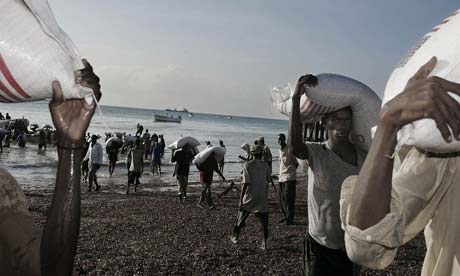Humanitarian organisations have yet to reach millions in Tigray who face famine and disease, eight days after Ethiopian authorities vowed to lift their blockade to allow the free passage of food, medicine, fuel and other desperately needed aid.
The World Health Organization has called for a massive influx of food and medicines to the war-torn northern region, saying aid had not yet been allowed despite humanitarian access being a key element of the peace deal signed between the Ethiopian government and the Tigray People’s Liberation Front (TPLF) eight days ago.
The WHO director general, Tedros Adhanom Ghebreyesus, welcomed the ceasefire agreement reached in South Africa, but said that after a week “nothing is moving in terms of food aid or medicines”.
He added: “Many people are dying from treatable diseases. Many people are dying from starvation … I was expecting that food and medicine would just flow immediately. That’s not happening.”
In the deal, the federal government agreed to end the blockade on Tigray imposed at the beginning of the war two years ago, while the TPLF, the political movement in power in the region, said it would disarm its forces.
The blockade has cut almost all communications and stopped banking and other commercial services. Healthcare for Tigray’s 6 million inhabitants has been reduced to minimal levels as facilities shut and medication ran short. Food, fuel and electricity have been scarce.
Within hours of the news of the deal last week, United Nations staff had begun talking to Ethiopian officials about reopening roads closed for months. Logistics specialists said they were able to begin sending convoys loaded with much-needed supplies “almost immediately”.
Doctors and aid workers in the region have described a race against time to keep sick or malnourished patients alive as they wait for humanitarian assistance.
The WHO emergencies director, Michael Ryan, welcomed the notion of a humanitarian corridor into Tigray but said experience in other crises showed it was vital that the corridor remained open “and unrestricted”.
“The people in Tigray need immediate, massive, overwhelming assistance now,” he said.
Representatives of Ethiopia’s government are meeting a delegation from the TPLF in Nairobi to discuss how to begin implementing the ceasefire. The talks in the Kenyan capital were scheduled to last three or four days but have been extended.
According to an official familiar with the talks, both sides have recognised “the challenge of fully communicating with all their units to stop fighting”. The delivery of aid is also on the agenda.
In a statement on Thursday, the Ethiopian government said it was “working to deliver on its commitment to restoring services … in all towns in Tigray and the neighbouring Amhara and Afar regions”.
Analysts have raised concerns that the federal government could make access for humanitarian assistance contingent on progress on disarmament by the TPLF, even though the issues were not linked in the deal.
The agreement calls for the disarmament of the TPLF’s substantial forces within weeks, but there is concern about when other combatants who are not part of the deal will withdraw from Tigray. These include forces from Eritrea, which neighbours the region, and Ethiopia’s Amhara region.
There are unconfirmed reports of sporadic fighting and some looting in recent days, particularly where Eritrean troops allied with the Ethiopian government are concentrated. It is unclear who initiated any clashes.
Eritrean forces have fought alongside government troops and have been blamed for some of the worst atrocities. All sides have been accused of war crimes during the conflict.
Tedros, who is from Tigray and was previously Ethiopia’s health and foreign minister, called for basic services, such as banking and telecoms, to be reopened, and for journalists to be allowed into the region.
The conflict between the TPLF and Ethiopian central government forces began in November 2020 when Ethiopia’s prime minister, Abiy Ahmed, sent troops into Tigray after accusing local forces of an attack on government military bases.
A ceasefire agreed earlier this year collapsed in August, leading to bloody battles in which thousands have died and many more have been displaced.
Researchers at Ghent University, in Belgium, have calculated that several hundred thousand people in Tigray may have died since the conflict began, including from a lack of healthcare and from malnutrition.
More have died in neighbouring regions and the total would put the war in northern Ethiopia among the most deadly in recent decades.
The Ethiopian government accuses the TPLF, which played a leading role in the country’s ruling coalition until Abiy came to power in 2018, of trying to reassert Tigrayan dominance over the entire country. Tigrayan leaders accuse Abiy of leading a repressive government and discrimination. Both deny the other’s accusations.











